פרסומים נבחרים
-
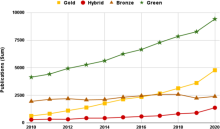
Policy shaping the impact of open-access publications: a longitudinal assessment
This study investigated the longitudinal impact of Open-Access (OA) publication in Israel, a country which has not yet adopted a formal OA policy. We analyzed bibliometric indicators of Israeli researchers across all academic disciplines, focusing on OA publications published in journals and repositories from 2010 to 2020. Data extracted from Scopus reveal a consistent “OA citation advantage” (OACA) throughout the study period, suggesting the influence of OA publication on citation rates beyond time and scientific novelty. Despite the highest number of publications in the green route, steadily increasing over the years, and a recent rise in gold route publications, the hybrid route demonstrates a significantly higher citation advantage, highlighting an “OA subtype citation effect”. Furthermore, our study uncovers a “funding effect” on OA grant-funded publications, indicating a doubled likelihood of publishing in OA when research is funded, contingent on the funder’s OA policy. The findings offer comprehensive insights into OA publishing trends in Israel, serving as a case study for assessing the impact of OA policy. The study underscores the importance of both funder-specific OA policies and broader initiatives by the global scientific community and intergovernmental organizations to promote OA publishing and address potential disparities in research dissemination. Efforts to combat the “rich get richer” effect can foster equitable access to scientific knowledge.
-
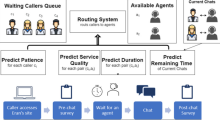
Machine-learning based routing of callers in an Israeli mental health hotline
המחקר החדש מציע שיטות חדשות המבוססות על שימוש באלגוריתמי למידה, עיבוד שפה ואופטימיזציה כדי לשפר את השירות של ער"ן על ידי התאמה טובה יותר של פונים למתנדבים
Background: Mental health contact centers (also known as Hotlines) offer crisis intervention and counselling by phone calls and online chats. These mental health helplines have shown great success in improving the mental state of the callers, and are increasingly becoming popular in Israel and worldwide. Unfortunately, our knowledge about how to conduct successful routing of callers to counselling agents has been limited due to lack of large-scale data with labeled outcomes of the interactions. To date, many of these contact centers are overwhelmed by chat requests and operate in a simple first-come-first-serve (FCFS) scheduling policy which, combined, may lead to many callers receiving suboptimal counselling or abandoning the service before being treated. In this work our goal is to improve the efficiency of mental health contact centers by using a novel machine-learning based routing policy.
Methods: We present a large-scale machine learning-based analysis of real-world data from the online contact center of ERAN, the Israeli Association for Emotional First Aid. The data includes over 35,000 conversations over a 2-years period. Based on this analysis, we present a novel call routing method, that integrates advanced AI-techniques including the Monte Carlo tree search algorithm. We conducted an experiment that included various realistic simulations of incoming calls to contact centers, based on data from ERAN. We divided the simulations into two common settings: standard call flow and heavy call flow. In order to establish a baseline, we compared our proposed solution to two baseline methods: (1) The FCFS method; and (2) a greedy solution based on machine learning predictions. Our comparison focuses on two metrics - the number of calls served and the average feedback of the callers (i.e., quality of the chats).
Results: In the preliminary analysis, we identify indicative features that significantly contribute to the effectiveness of a conversation and demonstrate high accuracy in predicting the expected duration and the callers' feedback. In the routing methods evaluation, we find that in heavy call flow settings, our proposed method significantly outperforms the other methods in both the quantity of served calls and average feedback. Most notably, we find that in the heavy call flow settings, our method improves the average feedback by 24% compared to FCFS and by 4% compared to the greedy solution. Regarding the standard-flow setting, we find that our proposed method significantly outperforms the FCFS method in the callers' average feedback with a 12% improvement. However, in this setting, we did not find a significant difference between all methods in the quantity of served-calls and no significant difference was found between our proposed method and the greedy solution.
Conclusion: The proposed routing policy has the potential to significantly improve the performance of mental health contact centers, especially in peak hours. Leveraging artificial intelligence techniques, such as machine learning algorithms, combined with real-world data can bring about a significant and necessary leap forward in the way mental health hotlines operate and consequently reduce the burden of mental illnesses on health systems. However, implementation and evaluation in an operational contact center is necessary in order to verify that the results replicate in practice.
-
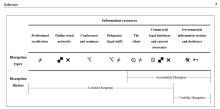
Information disruptions and disruptive information sources in the practice of law: Obstacles in gathering information, through an Israeli lens
מקורות מידע מקצועיים נתפשים ככאלו שמספקים את המידע שנחוץ ומסייע. אך האמת שונה. מחקר חדש של ד"ר יוסף סולומון מצא כי מקורות מידע שבשימושם של עורכי דין בישראל – לעיתים דווקא משבשים את עבודתם המשפטית. במחקר איכותני שערך ופורסם בימים אלו ב-Journal of Librarianship and Information Science ד"ר סולומון מצביע על שבעה מקורות מידע משבשים ועל שלושה היבטי שיבוש מידע (גישה, תוכן ושמישות), שמערימים קשיים מעשיים על אוריינות המידע של עורכי דין בפרקטיקה המשפטית ועשויים אף לחבל באינטרס הלקוחות המיוצגים. המחקר נוגע ב"צד האפל" של התנהגות איתור המידע המקצועית, שאינו נחקר כמעט, ותורם להבנה מלאה ונאמנה יותר של פרקטיקת המידע בענף המשפט.
-

It’s too much for us to handle—The effect of smartphone use on long‑term retrieval of family photos
We tested the use of smartphones for retrieval of pictures of long-term, salient family events. Our goal was to replicate a study conducted a decade ago where participants used digital cameras. We found that smartphones affected picture retrieval in two contrasting ways. Overall, the constant availability of smartphones increased collection size. This increased the failure percentage for pictures downloaded to computer file system folders from an average of 43% in the original study to 71% in the current one. On the other hand, improved smartphone retrieval technologies including timeline, search, and face recognition reduced smartphone application retrieval failures to 29% on average. Overall, these two opposing tendencies canceled each other out, with no significant difference in failure percentage and retrieval time between the two studies. Results indicate that the magnitude of pictures is too much for us to manually handle and we must rely on technology for picture retrieval.
-
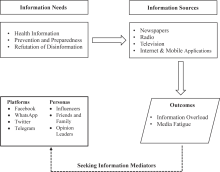
Information needs and seeking behaviors of Israeli citizens during the COVID-19 outbreak
Purpose – The aim of this study is to examine the information needs and information seeking behaviors of Israeli citizens during the outbreak of the coronavirus disease (COVID-19) in 2020, with an emphasis on the dissemination of digital information by government agencies. Design/methodology/approach – The research approach underlying this investigation is of the “case study” type, employing semi-structured, in-depth interviews conducted with 24 Israeli citizens regarding their perceptions and experiences with government information and government services during the first months of the coronavirus. Findings – The findings of this study reveal that most participants indicated feelings of media fatigue as a result of increased exposure to news media and social media, to the point of experiencing information overload. Second, participants described feeling a lack of clear information and poor access to accurate health and official information at the outset of the COVID-19 crisis in Israel. Third, participants in the authors’ study noted that most of the information to which they were exposed about the virus came to them through communal connections such as friends and family, via social media and messaging apps like WhatsApp. In general, the participants expressed satisfaction with the quality and availability of the data and extensive information of government ministries on social networks, together with a lack of satisfaction due to difficulties in usage and a lack of clear information on traditional government websites. Originality/value – The findings present the information acquisition and the experience of citizens in situations of national emergencies and crises, in a new light, through a focus on the dissemination of government, health and news information. Keywords COVID-19, Government information, Information needs, Social media, Israe
-
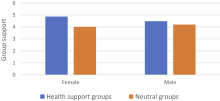
Facebook medical support groups: the communication privacy management perspective
Purpose – Exploring the considerations that guide and influence members of Facebook medical support groups to disclose private information. Design/methodology/approach – The sample included 293 participants, aged 18–85 years, who answered an online survey, 155 members of Facebook medical support groups and 138 members of other Facebook groups. Findings – Members of medical support groups attach greater importance to privacy policy, give greater value to privacy and reveal more private information, compared to members of other groups. Members of medical support groups tend to feel that they receive more support and feel that the privacy policy preserves their privacy much more. These feelings are associated with greater self-disclosure of groups’ members. Originality/value – The research insights will help medical support groups’ members and admins to put into action the fundamental right to privacy and build a set of rules tailored to their individual and group needs.
-

Do blog citations correlate with a higher number of future citations? Research blogs as a potential for alternative metrics
Thelwall, M Shema H Bar-Ilan J
Journal of the Association for Information Science and Technology, 65(5), 1018-1027.
-
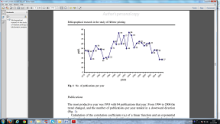
Bibliographical research in the study of Hebrew printing: a bibliometric analysis
Scientometrics, 88
with E. Lapon-Kandelshein
-
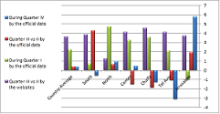
"Wisdom of the crowds" and online information reliability: A case study of Israeli real estate websites
Online Information Review, 2014
-
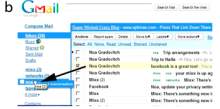
Folder vs. tag preference in personal information management
Journal of the American Society for Information Science and Technology 64(10)



